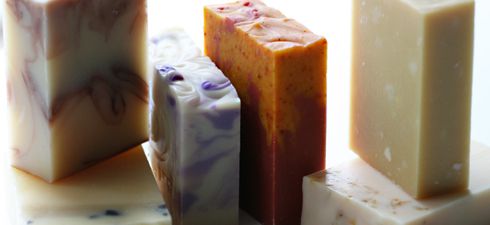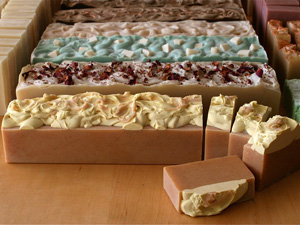About Absolute Handmade Soap
What's great about Absolute handmade soap (and why should you care)?
 Before we explain what we mean when we talk about real handmade soap, it's worth talking about what the soap that most people buy at the supermarket - the stuff most of us grew up using - is. Because that's a huge part of understanding why Absolute handmade soap feels so great to use, and why we started making it in the first place.
Before we explain what we mean when we talk about real handmade soap, it's worth talking about what the soap that most people buy at the supermarket - the stuff most of us grew up using - is. Because that's a huge part of understanding why Absolute handmade soap feels so great to use, and why we started making it in the first place.
The soap that most people think of when you say the word "soap," the stuff you see on store shelves and in restaurant bathrooms is, in fact, pretty much a block of pressed detergent (or a pump dispenser of liquid detergent), akin to what you'd use in your washing machine. It's made using chemicals with names like sodium laureth sulfate, decyl glucoside and pentasodium pentetate; words you'll NEVER see on the label of any Absolute handmade soap (which is a good thing, because we can't pronounce them anyway).
Often, even soaps claiming to be "pure," or using words like "natural" (or common variants like "nutri") usually contain these chemicals (or their equivalent cousins). Commercial soaps also often contain petroleum (irritating to people with sensitive skin), esters (known carcinogens), alcohols (which dry your skin), animal tallow (yes, really: animal fat - no kidding) low grade oils, waxes, fillers, detergents and preservatives.
But Absolute handmade soap contains none of that. In fact, it has almost nothing in common with those other products besides the word "soap" itself. So the first thing that you need to know about Absolute soap is what it isn't: it's not commercially produced, it's not produced using chemicals, it's not tested on animals. Ever.
Instead, Absolute soap is handmade using pure, natural saponified coconut, palm, olive, avocado and other oils. Most bars include organic cocoa butter and unrefined shea butter, some include botanicals, clays, charcoals, cocoa and even coffee to help moisturize, exfoliate and purify. That's why every bar is nourishing, moisturizing soap that won't irritate or dry your skin.
 In addition to the lack of chemicals and animal fats, Absolute handmade soap has other advantages over commercial soap, like the naturally occurring glycerin that keeps skin moist and supple. When oils are saponified (the process of combining fat and an alkali), two things are produced: soap and glycerin. In commercial soaps, even those with a minimum of chemicals, the glycerin is often separated from the soap and removed. It's then utilized to make more profitable products, including cosmetics, medicine, printing inks and even explosives.
In addition to the lack of chemicals and animal fats, Absolute handmade soap has other advantages over commercial soap, like the naturally occurring glycerin that keeps skin moist and supple. When oils are saponified (the process of combining fat and an alkali), two things are produced: soap and glycerin. In commercial soaps, even those with a minimum of chemicals, the glycerin is often separated from the soap and removed. It's then utilized to make more profitable products, including cosmetics, medicine, printing inks and even explosives.
Occasionally a small amount is added back to the final process in an effort to make the product appear to be moisturizing. Of course what they never mention on the label is that they took a lot more out than they put back in. But in when we make Absolute soaps, we leave ALL the glycerin in, allowing our bars to provide deep moisturizing benefits.
In the end, it comes down to one simple choice: use blocks of detergent or commercially produced soap that's been stripped of its natural moisturizing properties and augmented with chemicals, or use real soap, handmade from natural oils and allowed to cure naturally over time, keeping its natural benefits intact.
Once you know the facts, we think you'll agree there's only one choice:
